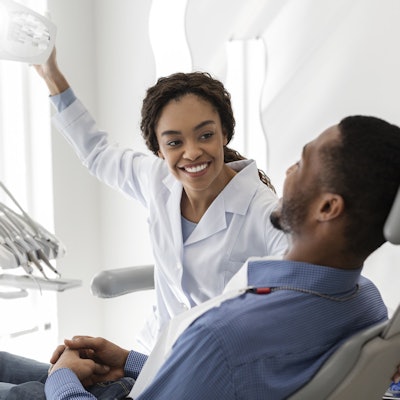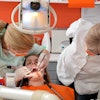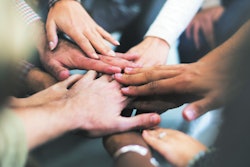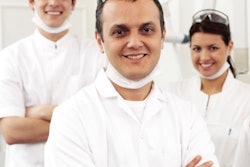
The picture of oral health in the U.S. has steadily improved in recent years. But oral health still remains an important public health concern, especially among low-income and minority populations. Moreover, the pandemic has only served to amplify health disparities and underlying conditions among racial and ethnic minorities.
To address unmet needs in underresourced communities and leverage their collective impact, the Hispanic Dental Association, the National Dental Association, and the Society of American Indian Dentists have joined to form the Diverse Dental Society (DDS). Their collective goal is to support oral health awareness among minority communities.
 DDS President Dr. Anna Munné.
DDS President Dr. Anna Munné."These three individual organizations have been established for some time, and we have historically collaborated on different occasions with conferences, educational events, and leadership training," Dr. Anna Munné, president of the DDS, said in an interview. "But we realized that we need to work more closely together and unify our efforts because we face many common problems and challenges."
The main objective of the DDS, a nonprofit 501(c)(3) organization, involves broadening the availability of good oral care and health to include patients from a wider range of ethnic, demographic, and socioeconomic backgrounds, according to the organization.
"Oral health can manifest itself and also have repercussions on our overall health," Munné continued. "The medical community has known that for years. The public has only become a little more aware of that in the last few years."
Although concerns had been expressed about oral health, there was a need for a unified organization to address unmet oral and healthcare needs of underserved populations through service, education, outreach, and advocacy, Munné and other professionals believed.
"We want to be instrumental in facilitating more access to care for all diverse populations," she said. "That's when we realized the issue requires more than just doing a conference or having joint meetings. We needed an organization that unifies all of us and helps us to be more impactful toward reaching our goal."
Often a matter of trust
“That's when we realized the issue requires more than just doing a conference or having joint meetings.”
Ideally, any person should feel comfortable going to any dentist, but that's not always the case for diverse populations, Munné said.
"They may not want to go to a dentist because they don't understand their language. They think the dentist doesn't understand them," Munné explained.
In addition, many people prefer to be treated by, and are more comfortable with, providers with whom they have a cultural affinity. The provider may understand their diet and customs and even speak their native language, she noted.
Munné said patients have told her that they couldn't trust other dentists because they couldn't understand them, even with translators present. They may also be facing other challenges or underlying issues.
"They may be less educated and may not have the best financial means," Munné said. "They also may be in poor health and have poor family dynamics."
More diversity in practice
As part of its effort to educate diverse communities, the DDS believes it is important to increase the number of diverse professionals who are practicing. One way to do this is to facilitate their dental careers. The DDS may offer student scholarships toward this end, according to Munné.
In addition, education and outreach to underresourced communities can be done in many ways, Munné indicated. Some of her ideas included coloring books for children, leveraging YouTube and social media, and doing outreach.
"We can go into the neighborhoods and do outreach in nursing homes, homeless shelters, veterans' homes, and schools," she said.
Participation can help
Although issues often are faced by those in marginalized communities, Munné indicated that all dentists could support the DDS mission by becoming members of any of the three related organizations -- the Hispanic Dental Association, the National Dental Association, and the Society of American Indian Dentists.
Current total membership of those three organizations stands at between 4,000 and 5,000, she indicated. Dentists are also welcome to participate in an educational or other type of outreach event.
The DDS plans to hold its Multicultural Oral Health Summit in June in Atlanta, which will be an opportunity for face-to-face engagement among members and between members and vendors, according to the organization.



















